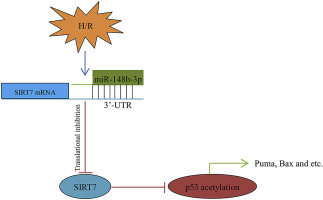Chemico-Biological Interactions ( IF 4.7 ) Pub Date : 2018-10-09 , DOI: 10.1016/j.cbi.2018.10.003 Meng Sun , Mengen Zhai , Nan Zhang , Rui Wang , Hongliang Liang , Qinghua Han , Yongping Jia , Liqin Jiao

|
Accumulating evidence has suggested that microRNAs (miRNAs) are emerging as critical regulators in myocardial ischemia/reperfusion injury. miR-148b-3p has been reported to regulate cell apoptosis of various cell types. However, whether miR-148b-3p is involved in regulating cardiomyocyte apoptosis in myocardial ischemia/reperfusion injury remains unknown. In this study, we aimed to investigate the potential role and molecular mechanism of miR-148b-3p in regulating cardiomyocyte apoptosis induced by hypoxia/reoxygenation (H/R) injury in vitro, a cellular model of myocardial ischemia/reperfusion injury. We found that miR-148b-3p expression was significantly up-regulated in response to H/R treatment in cardiomyocytes. Functional experiments showed that miR-148b-3p overexpression significantly decreased the viability, increased LDH release and promoted the apoptosis of H/R-treated cardiomyocytes. In contrast, miR-148b-3p inhibition improved the viability, decreased LDH release and reduced the apoptosis of H/R-treated cardiomyocytes, showing a protective effect against H/R-induced injury. Bioinformatics analysis predicted that Sirtuin7 (SIRT7), a critical stress survival gene of cardiomyocytes, was a potential target gene of miR-148b-3p, which was then validated by dual-luciferase reporter assay, real-time quantitative polymerase chain reaction and Western blot analysis. Moreover, our results showed that miR-148b-3p regulated the acetylation of the p53 protein and modulated p53-mediated pro-apoptotic signaling through targeting SIRT7. Notably, the silencing of SIRT7 significantly abrogated miR-148b-3p inhibition-mediated cardio-protective effects, while SIRT7 overexpression rescued miR-148b-3p-induced cell apoptosis in cardiomyocytes with H/R treatment. Overall, our results indicate that miR-148b-3p contributes to the regulation of H/R-induced cardiomyocyte apoptosis in vitro through targeting SIRT7 and modulating p53-mediated pro-apoptotic signaling.
中文翻译:

MicroRNA-148b-3p通过调节SIRT7 / p53信号传导参与体外调节缺氧/复氧诱导的心肌细胞损伤
越来越多的证据表明,微小RNA(miRNA)逐渐成为心肌缺血/再灌注损伤中的关键调节因子。据报道,miR-148b-3p可调节各种细胞类型的细胞凋亡。然而,在心肌缺血/再灌注损伤中,miR-148b-3p是否参与调节心肌细胞凋亡尚不清楚。在这项研究中,我们的目的是调查的miR-148B-3P的调节心肌细胞的潜在作用和分子机制诱导细胞凋亡缺氧/复氧(H / R)损伤体外,是心肌缺血/再灌注损伤的细胞模型。我们发现,心肌细胞中响应H / R处理的miR-148b-3p表达明显上调。功能实验表明,miR-148b-3p过表达显着降低了存活率,增加了LDH的释放,并促进了经H / R处理的心肌细胞的凋亡。相反,miR-148b-3p抑制可改善H / R处理的心肌细胞的活力,减少LDH释放并减少其凋亡,显示出对H / R诱导的损伤的保护作用。生物信息学分析预测,Sirtuin7(SIRT7)是心肌细胞的关键应激存活基因,是miR-148b-3p的潜在靶基因,然后通过双荧光素酶报告基因分析,实时定量聚合酶链反应和Western blot进行验证分析。而且,我们的结果表明,miR-148b-3p通过靶向SIRT7调节p53蛋白的乙酰化并调节p53介导的促凋亡信号转导。值得注意的是,SIRT7的沉默显着消除了miR-148b-3p抑制介导的心脏保护作用,而SIRT7的过表达通过H / R处理挽救了miR-148b-3p诱导的心肌细胞凋亡。总体而言,我们的结果表明miR-148b-3p有助于调节H / R诱导的心肌细胞凋亡 SIRT7过表达通过H / R处理挽救了miR-148b-3p诱导的心肌细胞凋亡。总体而言,我们的结果表明miR-148b-3p有助于调节H / R诱导的心肌细胞凋亡 SIRT7过表达通过H / R处理挽救了miR-148b-3p诱导的心肌细胞凋亡。总体而言,我们的结果表明miR-148b-3p有助于调节H / R诱导的心肌细胞凋亡在体外通过靶向SIRT7和调制p53介导的促凋亡信号传导。











































 京公网安备 11010802027423号
京公网安备 11010802027423号